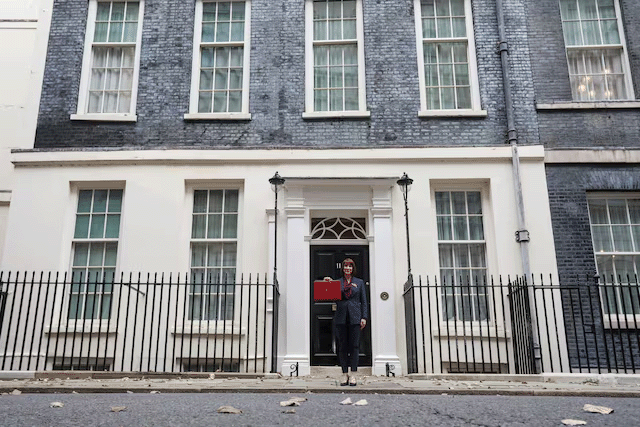Britain’s Chancellor of the Exchequer Reeves carries the red budget box at Downing Street, in London
Britain’s Chancellor of the Exchequer Rachel Reeves poses with the red budget box outside her office on Downing Street in London, Britain October 30, 2024. REUTERS/Isabel Infantes Purchase Licensing Rights, opens new tab
British finance minister Rachel Reeves on Wednesday said capital gains tax for most assets would increase to 18% from 10% at the lower rate and increase to 24% from 20% for higher earners, saying changes to the regime would raise 2.5 billion pounds.
The increase in capital gains tax brings the rate for most assets in to line with the rate payable on property, which Reeves said the would be maintained at 18% and 24%.
“We need to drive growth, promote entrepreneurship and support wealth creation, while raising the revenue required to fund our public services and restore our public finances,” Reeves said.
“This means the UK will still have the lowest capital-gains tax rate of any European G7 economy.”
Capital gains tax is paid on profits of more than 3,000 pounds ($3,900) made when an asset is sold, and rates depend on how much you usually pay in income tax, and how large the gain is.
Reeves also announced that the capital gains tax charged on carried interest would rise to 32% from 28%, saying that the fund management industry provided “a vital contribution to our economy but… there needs to be a fairer approach to the way carried interest is taxed.”
Reeves said that in order to encourage entrepreneurs to invest in their businesses, the lifetime limit for Business Asset Disposal Relief would be kept at 1 million pounds, and would remain at 10% this year, rising to 14% in April 2025 and 18% in 2026-27.
“The OBR say these measures will raise 2.5 billion pounds by the end of the forecast,” Reeves said.
Capital gains tax raised 15 billion pounds in the last financial year, and is currently worth around 4% of receipts from all taxes on income. It is charged at a much lower rate than the upper rates of income tax, reflecting past attempts to encourage entrepreneurship.
But this led to hundreds of thousands of self-employed people converting ordinary income into capital gains.
Capital gains tax is not normally payable when a person sells their primary residence, but is payable if on the sale of second properties. ($1 = 0.7699 pounds)





